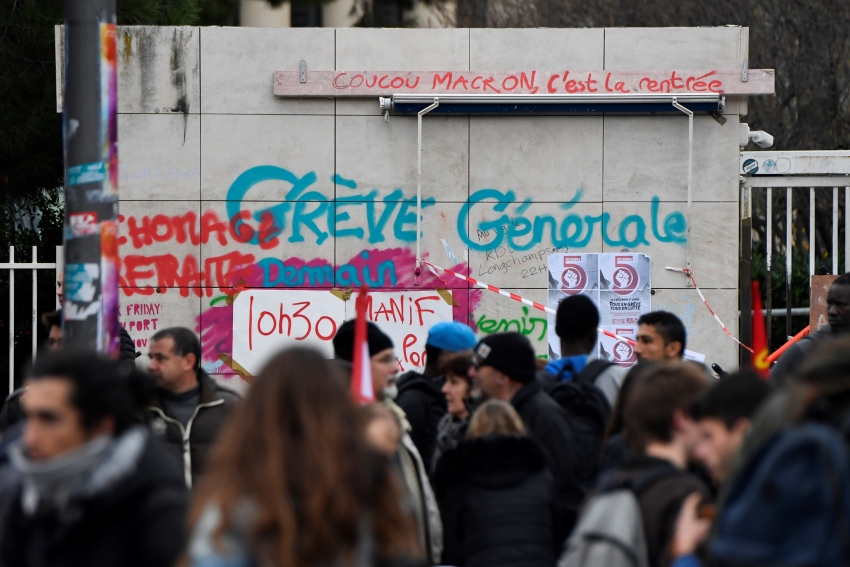
People gather in front of the Saint Charles university ahead of a demonstration to protest against the pension overhauls, in Marseille, southern France, on December 5, 2019 as part of a national general strike. -(Photo by Clement MAHOUDEAU / AFP)

Share
For more than a week, hundreds of thousands of people have been taking to the streets of France in a general strike protesting the potential degradation of the country’s pension system. One of France’s largest public-sector strikes in recent history, the action has united a wide array of workers, including air-traffic controllers, teachers and hospital staffers.
The country currently has 42 separate pension plans for both private- and public-sector workers, based on occupation and region. Under a proposal from President Emmanuel Macron, these plans would be consolidated into a universal “points-based” model that would slash pensions, particularly for public-sector workers, and raise the retirement age for many workers.
As of December 5, 82% of rail conductors were participating in the work stoppage, with at least 90 percent of all regional rail services closed. In response, Paris’s bus and metro operator, Régie Autonome des Transports Parisiens (RATP), is offering discounts on rides with 32 private transportation companies—including Uber’s e-bike and e-scooter vertical, JUMP and e-scooter company Lime—in an attempted strike break.
Under the pension proposal, transportation workers would face a substantial decline in their work benefits, as well as an acute threat to their mental and physical health. According to news site France 24, metro drivers can “in theory, retire at 50.8 years due to the particularly unhealthy environment they are subjected to, including pollution and the lack of daylight,” though metro workers’ average retirement age is 55.5. The official retirement age in France is 62, but the government’s proposal would raise the retirement age by at least two years, according to a recent speech by Prime Minister Édouard Philippe.
“It is very alarming that a public transportation agency would partner with private companies so as to undermine worker power,” Mostafa Maklad, a U.S.-based driver for Uber, Lyft and GrubHub, and organizer with Gig Workers Rising, told In These Times.
Frédéric Ruiz, president of the CFE-CGC union, told France 24 that the move sends a “bad signal” to workers for the RATP system, calling it a “provocation.”
This isn’t the first time Uber has sought to subvert a solidarity movement. Following President Donald Trump’s 2017 Muslim Ban, which restricted travel for people living in seven predominantly Muslim countries, protesters gathered at airports throughout the United States. While the New York Taxi Workers Alliance urged its members to avoid John F. Kennedy International Airport for one hour, Uber lowered fares to lure riders during the demonstrations, prompting widespread outrage. (In the wake of the backlash, the company offered to “support” drivers affected by the ban.)
Lime told In These Times, “Although the circumstances are unfortunate and exceptional, Lime is honored to have been selected by RATP to answer the increased demands for mobility during this period. We hope, nonetheless, for a rapid return to ‘business as usual,’ and we are committed to supporting Parisians throughout the social movement period.”Uber told In These Times, “To make it easier for our riders to get from A to B, we will offer drivers incentives to help people move around their cities. We have also partnered with the Paris Public Transport Operator (RATP) and will offer our JUMP e-bikes in key areas such as public transport hubs, to ensure Parisians have access to reliable and affordable transportation.”
RATP’s move reflects the anti-worker ethos that has defined Macron’s governance. In 2017, the French president vowed to render France a country that “thinks and moves like a startup,” complete with slackened, pro-corporate labor and tax laws in the interest of tech-focused “innovation.” In 2018, as part of that campaign, Macron’s administration announced plans to privatize a utility company and two airports, reportedly to provide a fund for “entrepreneurs and startups.”
This raises another concern: The encroachment of private travel companies upon public transit systems. Rideshare companies have indicated ambitions to replace public transit. A 2019 New York Times op-ed noted that Uber claimed to find a “massive market opportunity” in public transit; the company stated that “a portion of our trips can be a substitute for public transportation.” Accordingly, Uber and Lyft have both introduced features encouraging riders to board cars at dedicated intersections—effectively “reinventing” the bus system. The companies have also partnered with municipal governments in the U.S., Canada, Australia and England to incentivize rideshare, e-bike, and e-scooter use in tandem with public transit.
“This is just another opportunity for a big, giant megacorp like Uber to come in like jackals and take advantage of a volatile situation,” Tyler Sandness, a U.S.-based Lyft driver and organizer with Rideshare Drivers United, told In These Times. “They’re viewing it as, ‘This is just another example of why public transportation doesn’t work very well. Obviously, we just need to get rid of public transit and just have Lyft and Uber companies, and that will fix everything,’ despite the fact that these transport workers are fighting for their rights.”
The transport strikes will continue indefinitely, until “the government comes to its senses,” according to Laurent Brun, head of France’s Confédération Générale du Travail (CGT) railway union.
In the meantime, added Maklad, “workers must stand in solidarity with the public transport workers of Paris, and we must continue to demand better of our public agencies and government.”
This article first appeared in In These Times

